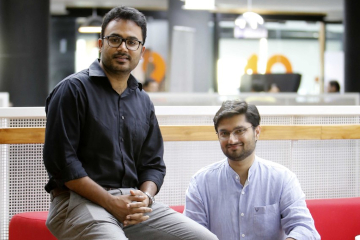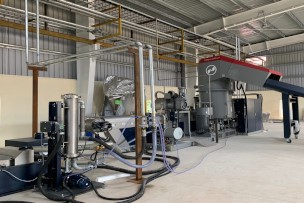A Passion for Problem Solving
The idea behind Banyan Nation came to Mani while walking along the polluted streets and riverbeds of his home country, where he observed the unfulfilled potential of the informal and illegal plastics recycling sector in India. Despite recycling 70% of its plastic, about double the rate of Western countries, India was unable to reap the benefits of this sector because of its rudimentary techniques and irregular channels. This perspicacious understanding, as well as an inherent desire to solve development problems in India, motivated Mani. He partnered with his roommate from the University of Delaware, Raj Madangopal, who shares his passion for efficient waste management. The two formed their enterprise in 2013 in Hyderabad. The name was inspired by the banyan tree, a national symbol in India under which problems are traditionally solved.
Transforming the Waste Value Chain
Banyan incorporates the entire waste value chain into its business model, which is based on two innovative processes: an award-winning data intelligence platform and their proprietary plastics cleaning process.
First, Mani and Raj developed a data intelligence system that traces plastics recycling activities in major Indian cities. This enables a team of local procurement agents to map informal collectors, aggregators, and sellers of recycled plastic. Not only does this platform track the location and volume of the recycled plastic along the supply chain, but even details pricing, types of material, use of the material, and more. With this precise information, Banyan collects plastic materials from this informal sector as its supply chain. “Our platform started as an internal tool, but has taken on a life of its own, as it is now deployed by governments and organizations across multiple cities to track the generation and flow of solid waste”, says Rashi Agrawal, Director of Partnerships for Banyan Nation. The company is currently exploring how this scalable platform can be applied in other developing countries as well.
Second, Banyan uses its proprietary process to clean the recycled plastic it collects. The near-virgin grade recycled plastic granules that are produced are then sold by Banyan as input for a variety of mainstream consumer and industrial brands. Previously, the informal nature of this sector in India meant most of these recycled plastics were not applicable for the production processes of top manufacturers, as they contained inks, coatings, and other contaminants. However, Banyan’s process effectively removes these contaminants and can be customized for the specific thermal and mechanical needs of brands on a large scale. Their materials are being successfully used by major brands in the automotive and cosmetic industries.
Advancing the SDGs through Sustainable Chemistry
However, it is not just what Banyan is doing that is so impressive, but also how they are doing it. Furthermore, Rashi adds, “we are trying to reduce the impact of what we create, maximizing efficiency and contributing to the SDGs as much as we can.” First and foremost, Banyan helps achieve sustainable production and consumption patterns (SDG 12) by creating closed loop production processes for plastic products that minimise waste and use environmentally-friendly solvents and detergents. This facilitates a circular economy in a wide range of industries, particularly those distributing fast-moving consumer goods (FMCGs).
Furthermore, Banyan contributes significantly to protecting marine environments and the quality of water supply in India (SDGs 14 & 6). A treatment plant has been established to remove any impurities from both incoming and outgoing water. Banyan has also partnered its data intelligence platform with an Indian non-profit organisation to help reduce plastics pollution in rivers. Finally, Banyan contributes to building sustainable cities and communities (SDG 11) through its partnerships with cities for improving waste management and by ensuring fair and immediate pay for those involved in its value chain, which is atypical in the existing informal channels.
Pioneering in Plastics
Banyan has already experienced a good deal of success. Its work in creating a closed loop recycling initiative in the automotive sector (i.e., making new bumpers from recycled ones) has established it as one of the most innovative start-ups in Indian manufacturing. In 2018, Banyan Nation won the 2018 Dell Circular Economy People’s Choice Award at the annual World Economic Forum in Davos, the first Indian company to do so. Of course, Mani and Raj have not stopped there. In November 2019, they opened a new production facility capable of producing 6,000 tons of high quality recycled plastics annually, and is equipped to expand to 30,000 tons. Furthermore, they are exploring applications of their proprietary process into new industries, such as agriculture and furniture.
Since May 2019, Banyan Nation has been on-boarded to the ISC3 Global Start-up Service, the world’s first programme supporting sustainable chemistry innovators worldwide. This Start-up Service supports entrepreneurs along the entire innovation chain and offers them a wide range of services. In the frame of this support programme, Banyan were invited to present their idea during the Workshop on Green & Sustainable Chemistry-based Entrepreneurship organized by the ISC3 and Green ChemisTree Foundation at the Industrial Green Chemistry World Conference in Mumbai, India, in October 2019.



